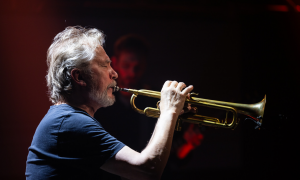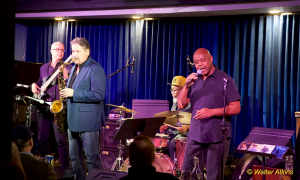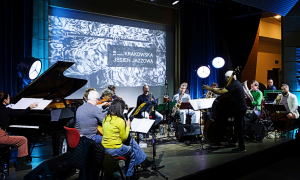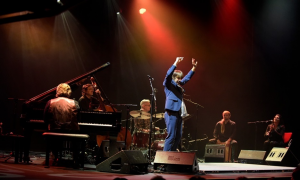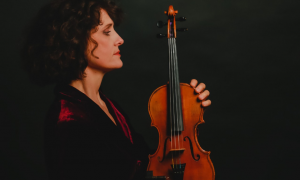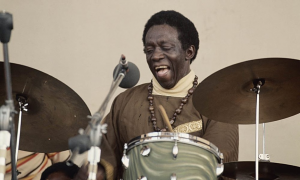Home » Jazz Articles » Live Review » Belgrade Jazz Festival 2024
Belgrade Jazz Festival 2024

Courtesy Tim Dickeson
The Belgrade Jazz Festival continues to build on its reputation as one of the best-put-together autumn jazz events in Europe.
Dom Omladine Beograda, MTS Dvorana
Belgrade, Serbia
October 24-28, 2024
It is possible that, of all the major cities of Europe, the least understood in the Western world is Belgrade, Serbia. In the 1990's, when the wars in the former Yugoslavia were raging, Serbia was a major topic in the world news media. A NATO aerial bombing campaign in 1999 ended the conflict. Serbia was left with a severely damaged economy and its former president, Slobodan Milošević, incarcerated in The Hague (home of the International Criminal Court). After the breakup of the Yugoslav federation, the republics of Croatia and Slovenia quickly became members of the European Union. Serbia has not yet met the requirements to join.
But Belgrade is a fascinating place to visit. The best-known tourist site is the grand, imposing Belgrade Fortress. From its ramparts there are stunning panoramic vistas of the confluence of the Danube and Sava rivers. The Temple of St. Sava, one of the largest Eastern Orthodox churches in the world, is another major landmark. The Nikola Tesla Museum is both fun and educational.
But the best thing to do in Belgrade is walk the streets. It is not a romantic destination. It is crowded, noisy, austere and covered in graffiti. There are zones of Soviet-era brutalist architecture. But there are also older sections with neoclassical and Art Nouveau buildings. The vibe of the streets has its own edgy energy. Sometimes Belgrade reminds you of certain hip, gritty aspects of New York. Both cities are notable for night life. Both cities never sleep. But New York is expensive to visit and Belgrade is not. You can eat extremely well in Belgrade for much less than half the price of New York. Fifteen years ago, when you walked the city, you regularly came upon the ruins of buildings bombed by NATO. Those shocking scenes of rubble and destruction have now mostly been covered or cleared away.
Belgrade is a unique jazz landing place. It is often said of Serbs that they possess a special sense of their own isolation. (The best-selling Norwegian author Åsne Seierstad wrote a book on the subject called With Their Backs to the World.) Most Serbs want to transcend their isolation. One community in which Serbia is a member in good standing is the international jazz community. Serbia's jazz history goes back 100 years, and its current local scene is strong. Serbs see jazz as a means of connection to a wider world. Jazz fans here are passionate.
The Belgrade Jazz Festival began in 1971. Belgrade was the capital of Yugoslavia then—the most "liberal" communist country. Through the 1970s and 1980s, the Belgrade festival became an important stop on the European jazz circuit. Duke, Miles, Dizzy, Ornette, Monk and many other major American and European artists played Belgrade. In 1991, because of the wars, the festival, like most good things in the Balkans, went dark.
The festival relaunched in 2005. It has gradually re-established its reputation for high standards. It is now identified with cutting-edge music. Almost all concerts take place in two venues in Dom Omladine (the Youth Center), in the center of Belgrade near Trg Republike (Republic Square). There is a nice 500-seat auditorium (Velika Sala) and a smaller space upstairs where the late night music happens (Sala Amerikana). For the bigger names, the festival uses the 1400-seat MTS Dvorana, a former communist trade union hall, now completely remodeled.
The opening night of the festival was in a nearly full MTS Dvorana. Alan Broadbent conducted Big Band RTS. The initials stand for "Radio/Television Serbia." Radio orchestras are no longer as plentiful in Europe as they once were, but they are still important to the cultural life of many cities. Big Band RTS is a sharp, skilled professional outfit. The set list was mostly Broadbent compositions and/or arrangements. He drew upon his whole life as a composer. Tunes such as "Between the Lines" and "Reunion at Newport" were decades old but sounded crisp and fresh. Both featured articulate solos by reed player Rastko Obradovic. The program also included standards, such as a hard hitting version of Miles Davis's "Walkin'" and a soaring celebration of "I Remember Clifford." The latter was a tribute to its composer, Benny Golson, who had passed away a month prior. The arrangement was by one of Serbia's first internationally known jazz musicians, Dusko Gojkovic. A song about Clifford Brown had to be a trumpet feature. Trumpeter Marko Dordević rose to the occasion. There were two impressive guest soloists, trombonist Gianluca Petrella of Italy and pianist Matija Dedić of Croatia.
The second half of the night was a stunning set by vocalist Cecile McLorin Salvant and her trio (pianist Sullivan Fortner, bassist Yasushi Nakamura and drummer Kyle Poole). When Salvant first came on the scene ten years ago, it was immediately apparent that she possessed a special vocal instrument. Since then, her chops have only deepened and her art has grown. Her large popular acceptance has not placed any limits on her creativity. She is a fearless, radical improviser. Sometimes she embellishes and distorts familiar songs almost beyond recognition. Sometimes her liberties sound indulgent, like technical displays. More often she uses her vast vocal resources to render revelations. She sang a Kate Bush medley of "Wuthering Heights" and "Breathing." The 1400 people in MTS Dvorana sat transfixed and silent, as Salvant barely whispered the last words of "Breathing": "out...in...out...in."
The middle three nights of the five-day festival were held in Dom Omladine. Anat Cohen exemplifies a paradox of art: she is from Israel, currently one of the places in the world most intimate with tragedy, and yet irrepressible joy and vitality flows continuously from her clarinet. She appeared in Velika Sala with the project she calls "Quartetinho," with Vitor Gonçalves, piano/accordion; Tal Mashiach, bass/guitar; James Shipp, drums/vibraphone. Cohen has a long-term affiliation with Brazil. She has said that, since she first visited that country in 2000, her life "has never been the same." In Belgrade, she played songs by Brazilian composers like Egberto Gismonti and her own pianist, Gonçalves. But Brazil is only one ingredient in the heady blend that is Quartetinho. The band's range is wide enough to include Thelonious Monk and Antonin Dvorak. Dvorák's "Going Home," with Cohen on bass clarinet, was a moving acknowledgement of all the exiles in our current world who wish only to find home.
Gianluca Petrella with his band Cosmic Renaissance followed Cohen. The contrast with Quartetinho was stark. The latter is subtle and seductive. The former wants to set your hair on fire. The sound of Cosmic Renaissance is built up from the thundering thrust of two drummers, Federico Scettri and Simone Padovani, over which trombonist Petrella and trumpeter Mirco Rubegni issue shattering brassy proclamations. Their long calls are dramatic and their forward momentum is furious. The risk of Petrella's music is stasis, because of repetition and the lack of harmonic contrast. But the excitement Cosmic Renaissance delivers is real. This band is not intellectual—it is visceral.
James Carter's set was also exciting on the festival's third night, but sometimes it felt more like the thrills you get from feats of athleticism than the fulfillment you get from art. In this tribute to tenor saxophonist Eddie Davis, Carter, a multi-instrumentalist, stayed with the tenor, on which his chops are outrageous. When he applied his zeal and expertise to "Stardust," that reverie of a song, he blew it to bits. He climbed far above the highest notes on a tenor saxophone, from which he shrieked the melody. If Carter's performance was more gymnastic than aesthetic, it was undeniably fun. And, like an Olympic champion gymnast, Carter always "stuck the landing."
Virtually all European jazz festivals set aside time for local musicians. Rarely are such presentations as successful as the one in Velika Sala in 2024. It was titled "Serbian All-Stars: Past, Present and Future." The "past" part of the program contained compositions by several of the major historical figures in Serbian jazz, such as Duško Gojković and Lala Kovačev. The tunes were performed by a quartet of the "present" led by Luka Ignjatovic, a current leading light of Serbian jazz and one of the best alto saxophonists in Europe. Then, one by one, the all-stars, representing the "future," came out: tenor saxophonist Rastko Obradovic (who had proven on opening night with Big Band RTS that he also plays beautifully on alto saxophone); trumpeter Ivan Radivojevic; flautist Milena Jancuric; bassist Miloš Čolović. They are all exceptional talents under 40. Each has released only a debut album, from which each played a tune. The night overall was both a testament to the strength of the Belgrade scene and further proof that bebop is an inexhaustible art form. In the hands of these special players, bebop was contemporary and relevant, and provided rich sources for their solos.
The fourth night of the festival was the strongest. It contained three memorable performances: Jason Moran and Rudresh Mahanthappa in Velika Sala and Kris Davis in Sale Amerikana. Moran gave a solo piano recital called "Ellingtonia." Some of his Duke Ellington interpretations, like "I've Got It Bad," included so much new improvised content that they were not initially identifiable. When their famous melodies finally clarified within Moran's wildly spontaneous piano outpourings, it was a rush. "Reflections" was noisy, blocky and thick. "It Don't Mean a Thing" was an ecstatic ceremony. "Melancholia" was simply one of the high points of the festival. Moran introduced it as Ellington's personal treatise on loss. He said he always thought of his own late mother when he played it. He marked it out quietly and patiently and lovingly, one soft, clear touch at a time. Moran's relationship to his instrument is complicated. His dominant attitude is aggression. He will sometimes attack the keyboard with a judo chop. But on "Lotus Blossom," he showed how aggression can intensify the emotion of a ballad. Moran used Billy Strayhorn's song to fill an entire auditorium with lyricism.
Rudresh Mahanthappa is one of the most decorated alto saxophonists in jazz, but he has been less visible than usual since the pandemic. His last record, Hero Trio, was released on the Whirlwind label in 2020. In Belgrade he said he plans "to get out more." He played tunes from the record, but not with his regular band of Francois Moutin and Rudy Royston. His bassist in Belgrade was Phil Donkin and his drummer was Tim Angulo. Mahanthappa started with the classic bebop of Charlie Parker, "Red Cross," and smoked it. He also played songs rarely made into jazz, like Johnny Cash's "Ring of Fire." From its simple sing-song melody (actually composed by Cash's eventual wife, June Carter Cash), Mahanthappa derived successive waves of arcane beauty. His singing, stinging alto sound, one of the most unmistakable in jazz, pierced the air of Velika Sala. The most powerful track on the album was also the best tune at the concert: a passionate, wheeling, wailing "I Can't Get Started." It segued between plaintive cries and quieter, more inward moments of aspiring.
Kris Davis's renown has swelled in the last five years. She now consistently places at or near the top of the major critics polls in categories like "Pianist of the Year" and "Album of the Year." She performed in Sala Amerikana with the group she calls "Diatom Ribbons." They are Nick Dunston, bass; Terri Lyne Carrington, drums; Val Jeanty, turntable and electronics. This band is unusual for its juxtaposition of a groove-obsessed rhythm section and an esoteric, often abstract, even avant-garde pianist. Davis plays intriguing, asymmetrical lines whose unpredictability requires alert listeners.
For the late shows in Sala Amerikana, audiences were smaller and more rambunctious in their tastes and their behavior. The performances there were a mixed bag. Emile Parisien, who has one of the world's loveliest sounds on soprano saxophone, played a loose, shapeless, quirky set. Tenor saxophonist Daniel Erdmann's "Velvet Revolution," with Théo Ceccaldi on violin and Jim Hart on vibes, sounded like a fortuitous encounter among three good players in search of a plan. The most mixed bag of all was Kompost 3. They too are good players, and their set had many compelling moments, often because of trumpeter Martin Eberle's vivid, varied ideas. But there were too many lulls, often because of keyboardist Benny Omerzell's obsession with humming sounds.
The last night was a sell-out in MTS Dvorana. There were two acts. One had created much anticipation among the jazz community of Belgrade: the Bill Frisell Four (Bill Frisell, guitar; Greg Tardy, reeds; Gerald Clayton, piano; Johnathan Blake, drums. The other band was the Buena Vista All-Stars. The latter was not of great interest to the jazz crowd. This booking was an example of the compromises that so many jazz festivals make in order to reach beyond the dedicated jazz audience and to sell tickets. (Belgrade has made far fewer such compromises over the years than many festivals.)
Not surprisingly, the Buena Vista All-Stars were a hit, but only with people who had not attended any other nights of the festival. What was completely unexpected was the tepid performance of the "Bill Frisell Four." This quartet contains three players who are very near the top of jazz on their respective instruments. (The fourth, Greg Tardy, is also highly regarded.) But in Belgrade there was a strange languor and a meandering randomness to their set. It was all very puzzling. Part of the problem may have been the sound in the hall, which made the music sound distant. Often Frisell got stuck in recurring phrases. Even when he was not using loops, what he played sounded like it was on repeat. Jazz is art of the moment. Therefore one of the reasons you go to a concert, even a concert by players you know and love, is to find out what happens. On this night, not much happened with the Bill Frisell Four. Chalk it up to jet lag or an off night or both.
These five days contained many more hits than misses. The Belgrade festival continues to build on its reputation as one of the best-put-together autumn jazz events in Europe. And the city is a place to go when you want to experience a world that feels new.
Tags
Live Review
Cecile McLorin Salvant
Thomas Conrad
Serbia
Belgrade
Åsne Seierstad
Alan Broadbent
Big Band RTS
Rastko Obradović
Miles Davis's
benny golson
Dusko Gojkovic
Clifford Brown
Marko Dordević
Gianluca Petrella
Matija Dedić
Sullivan Fortner
Yasushi Nakamura
Kyle Poole
Kate Bush
Anat Cohen
Quartinho
Vitor Gonçalves
Tal Mashiach
James Shipp
Egberto Gismonti
Thelonious Monk
Antonin Dvorak
Cosmic Renaissance
Federico Scettri
Simone Padovani
Mirco Rubegni
James Carter's
Eddie "Lockjaw" Davis
Lala Kovačev
Luka Ignjatovic
Ivan Radivojevic
Milena Jancuric
Miloš Čolović
jason moran
Rudresh Mahanthappa
Kris Davis
duke ellington
Francois Moutin
Rudy Royston
Phil Donkin
Tim Angulo
Johnny Cash's
June Carter Cash
Diatom Ribbons
Nick Dunston
Terri Lyne Carrington
Val Jeanty
Emile Parisien
Daniel Erdmann's
Velvet Revolution
Théo Ceccaldi
Jim Hart
Kompost 3
Martin Eberle's
Benny Omerzell's
Bill Frisell Four
Bill Frisell
Greg Tardy
Gerald Clayton
Johnathan Blake
Buena Vista All-Stars
Comments
PREVIOUS / NEXT
Alan Broadbent Concerts
Support All About Jazz
 All About Jazz has been a pillar of jazz since 1995, championing it as an art form and, more importantly, supporting the musicians who make it. Our enduring commitment has made "AAJ" one of the most culturally important websites of its kind, read by hundreds of thousands of fans, musicians and industry figures every month.
All About Jazz has been a pillar of jazz since 1995, championing it as an art form and, more importantly, supporting the musicians who make it. Our enduring commitment has made "AAJ" one of the most culturally important websites of its kind, read by hundreds of thousands of fans, musicians and industry figures every month.













